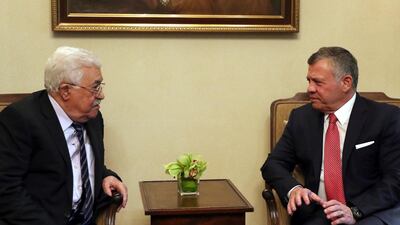Jordan’s foreign minister Ayman Safadi on Thursday said America's recognition of Jerusalem as the capital of Israel would "frustrate" peace efforts and provoke Muslims and Christians across the Arab world.
"Jordan rejects [the] decision and all its implications and will continue to work for an independent Palestine with East Jerusalem as its capital," Mr Safadi declared.
King Abdullah II added his voice to helping the Palestinians in "preserving their historical and legal status in Jerusalem" with East Jerusalem as their capital.
During talks at the Basman Palace on Thursday attended by Crown Prince Hussein, King Abdullah and Palestinian president Mahmoud Abbas said US president Donald Trump's decision was a violation of international law. The king called for intensified efforts to safeguard the rights of Palestinians, Arabs and Muslims in Jerusalem and said the international rejection of the US decision must serve as a foundation to avert unilateral steps that might be taken by other states.
King Abdullah and Mr Abbas stressed the importance of coordinating the Arab stance and making contacts with the international community on the dangerous repercussions of the US decision on the security and stability of the region as well as on peace making efforts.
King Abdullah urged the international community to shoulder its responsibilities and take a supportive and firm stance.
"The issue of Jerusalem should be settled within a comprehensive solution that leads to the establishment of an independent Palestinian state with East Jerusalem as its capital living in peace and security alongside Israel," he said. With Mr Abbas, he affirmed that any tampering with the historical and legal status of Jerusalem is null and void and will only lead to more tension and violence in the region and the world.
King Abdullah has been lobbying world leaders to counter any attempt by Israel to change the status quo in the holy city or to discard the two-state solution.
Also present at the talks were Prince Ghazi bin Mohammad, the King's chief adviser for religious and cultural affairs and personal envoy, the prime minister, the chief of the Royal Court chief, the foreign minister and the director of the King's Office. On the Palestinian side with President Abbas were the secretary general of the Palestine Liberation Organisation (PLO), a member of central committee of Fatah, the head of Palestinian Intelligence and the Palestinian ambassador to Jordan.
Foreign minister Mr Safadi issued a dire warning. "[The decision] puts us in a very dangerous situation, all of us. Peace in the Middle East is key to all of our interests. And, therefore, we need to all work together on peace."
As King Abdullah and President Abbas were meeting, at least 500 Jordanians demonstrated in front of the US embassy in Amman, chanting Anti-American slogans, demanding the closure of both the US and Israeli embassies and waving placards that read: “Jerusalem is the eternal capital of Palestine."
“We reject this decision. Jerusalem is the Arab capital of Palestine and we call on countries with peace treaties with Israel to annul them,” said Maysoon Momani, 55, a teacher and a left-wing activist. Others called for the 1994 peace treaty between Jordan and Israel to be cancelled
Former diplomat Issa Al Dabbah said, “I am here to support the Arab and the Palestinians, whose rights have been undermined by the Americans and Arab regimes."
Security around the US embassy was heavy and approach roads blocked off. But the demonstration never descended beyond minor scuffles as protesters tried to march on the embassy. )
The embassy temporarily suspended routine public services amid fears of protests which could turn violent.
Other small protests also erupted in other parts of Jordan, including Palestinians camps, but the bigger demonstrations are expected after Friday prayers.
“It is a dangerous move that will entrench the occupation in the West Bank, Gaza and Jerusalem,” said Murad Adaileh, the spokesman for the Islamic Action Front, the political win of the Muslim Brotherhood. “It indicates that the negotiations have come to an end and this will be at the expense of Jordan and its sovereignty. It will also impinge on the right of Palestinians to return to their country and would lead to another wave of refugees to Jordan.
Amman, a key US ally, is concerned that potential unrest in the Palestinian territories could spill into the country. Jordan also has a sizable Palestinian population of its own because so many fled into Jordan after the 1948 and 1967 wars with Israel.
Jordan too has a stake in Jerusalem since it serves as the custodian of Al Aqsa, Islam’s third holiest site in Jerusalem, a role guaranteed by the 1994 peace treaty - unpopular then and now.
The ministry of religious affairs called on preachers to dedicate Friday’s sermons to Jerusalem and Al Aqsa mosque and to address the issue of Jerusalem as a “gateway for security and stability,” based on religious evidence.
Despite Jordan’s fury with the Trump’s administration move, it is unlikely that the move will have an impact on bilateral ties.
“It is important to realise that Trump’s move was unilateral and not one that was adopted internationally,” said Amer Sabaileh, a political analyst and director of Middle East Media and Political Studies Institute, a think tank with an office in Amman. “Therefore, Jerusalem remains an international issue with a Christian and Muslim heritage which means that there is room to rally international support and co-operate with countries who are opposed to Trump’s move like the Vatican.”
“But it is unlikely that the move will strain ties with its allies like Jordan, which is largely dependent on US aid.

